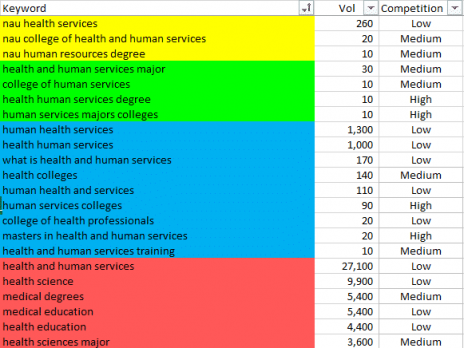Keyword utilization
Keywords are the terms or phrases people use in search engines to find web content that meets their needs. The keywords you place in your web content are terms and phrases you believe will make it possible for your audience to find your page with search engines. Choosing the right keywords that are relevant to your targeted audience is essential for search engine optimization (SEO) and improving page rankings in search engine results. University Marketing will conduct keyword research for your department and provide a keyword list to help you get started.
Where did these keywords come from & how do I use them?
Keyword research
Keyword research is conducted by the SEO analyst and incorporates the use of tools such as Google Search Console, AdWords, and other keyword research software. These tools provide real search data and metrics for users over the past year. Metrics delivered by these tools are:
- Search term
- Number of searches per month
- Search competition (recorded as a percentage or as low, medium, or high)
Once the target keywords are identified, all semantically related search terms and their metrics are recorded and ordered by search volume and current ranking.

Which keywords to use & where to put them
The primary target keyword is typically the main subject of the page. The keyword list shown above was developed for the NAU CHHS home page, and the targeted keyword was “nau health services”. It is also good practice to choose a secondary target keyword that is related to the page, but categorically different from the primary keyword. In the CHHS example, the secondary keyword was “health and human services”.
Where you place your targeted keywords also influences the SEO value of a webpage. The primary target keyword should generally be placed in the title and H1 heading of your page, while the secondary target keyword can be placed in the H2 heading. Additionally, try to fit these keywords into the content of the page as best you can without keyword stuffing.
Feel free to place additional keywords from your list into your content and prioritize by search volume. Again, make sure that placement of keywords doesn’t affect the flow of the sentence or phrase.
Additional keyword tips:
- Do your best to use keywords that have “Low” to “Medium” competition. This will increase the chance of a page to rank for that particular keyword
- The number of keywords to include depends on the length of your content. The more words that are on a page, the more keywords that page should include
Keyword questions and support
Please reach out to the NAU digital marketing team with any questions or requests for support.